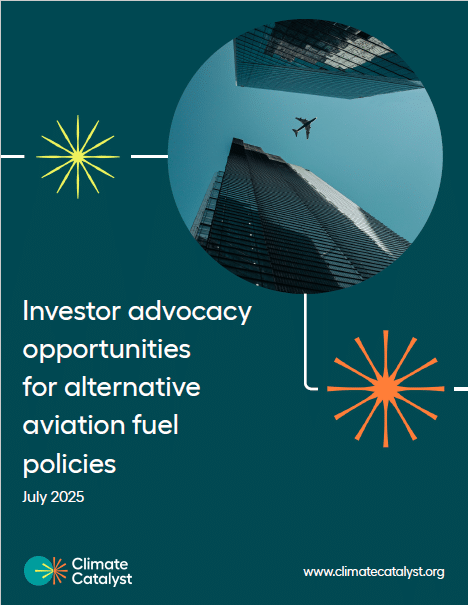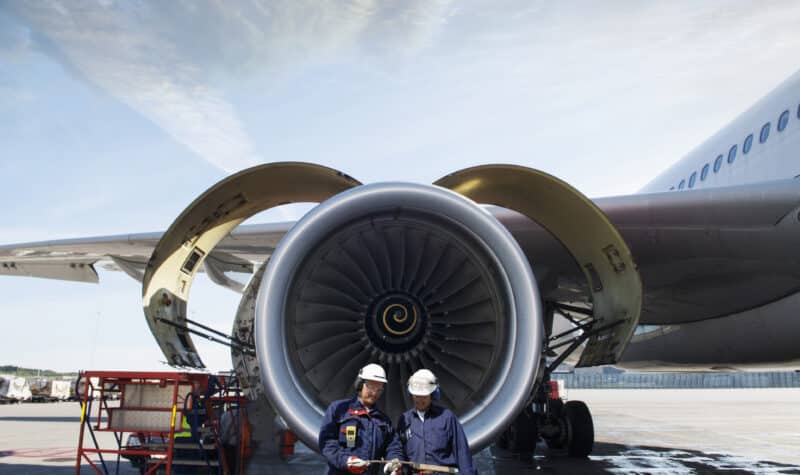Even with supply mandates in place in the EU and UK as of 2025, “sustainable aviation fuel” (SAF) production remains limited. The list of wide-ranging products that could be considered “SAF”, alongside varying criteria for permissible feedstocks and processes across the European region, has fostered uncertainty in the future alternative fuels market. This uncertainty is leading to inaction. The highest integrity fuels from a lifecycle emission reduction perspective — e-fuels — are struggling to scale and increase availability, with no plants having reached Final Investment Decision (FID) in Europe.
The policy mandates that are now in place have been designed to send strong demand signals with clear targets that support the scaling of alternative fuels, including e-fuels. They aim to drive growth in the alternative fuels market and attract significant private investment needed to commercialise these projects, with governments having already provided considerably public funding during the research and development (SEED) through to FEED stage. This is while conventional kerosene users have benefited from the absence of fuel taxation unlike for other transport modes, further warranting the need for the aviation fuel transition to be funded by the industry itself, and not through public funds or taxpayer subsidy.
However, the immaturity of e-fuel projects and technologies, alongside the overall nascence of the SAF market, has created risks in the investment case. Feedstock supply, specifically access to competitively priced renewable energy and green hydrogen in Europe, is a critical barrier. Revenue certainty remains a risk and inaction from incumbent fuel suppliers continues to stall progress. Moreover, current SAF policies lack targeted considerations for just transition and wider environmental factors beyond lifecycle CO2 reductions. These factors strengthen the case for e-fuels and are essential for the sustainable growth of the emerging fuels market whilst delivering financial returns to investors.
Collectively, this make it difficult for investors and financiers to consider projects as “bankable” without additional market interventions. As a result, European SAF production — especially for the highest integrity fuels — has started to stagnate, raising concerns that current mandated targets could eventually get revised, or ambition diluted.
The following European policy insights set out the opportunities for investors to play a critical role in advocating for ambitious, credible regulations. This would help guide the trajectory of the aviation fuels transition towards the highest integrity solutions, while supporting the sector reach its overarching target of net-zero emissions by 2050.
EU aviation fuel policies
ReFuelEU
ReFuelEU will be open for review in 2027, by which time ambition levels should be at least maintained, if not improved upon. There is a risk from delay in SAF plant deployment and the incumbent industry lobby that policymakers could relax some of the stringency in the mandate, for example around things like bio-based feedstocks, to avoid the regulatory targets being missed. Investors could advocate for the current ReFuelEU regulatory targets to be upheld, penalties enforced, and fuel and feedstock supplies strengthened, while engaging with the wider value chain of actors in support of the delivery of e-fuel sub-targets. They could also add their voice to calls for kerosene taxation in support of a just and equitable fuels transition.
Parallel to this, the EU Emissions Trading Scheme (ETS) funds are currently acting as a revenue certainty mechanism in support of ReFuelEU via the Fuels Eligible for ETS Allowances (FEETS) (estimated around €1.6 billion). Investors can call for the EU to finalise this scheme as a priority and could also advocate for directing ongoing ETS revenues beyond the FEETS allocation towards the Fuels Bank, particularly in support of scaling green hydrogen and renewable feedstock projects, as well as the Social Climate Fund in line with a just and equitable transition.
Sustainable Transport Investment Plan
While ReFuelEU is helping to create a strong demand signal for these alternative fuels, none of the 41 large-scale e-fuel projects under development in Europe — which would have the capacity to produce nearly three million tonnes of fuel — have reached final investment decision (FID). The Sustainable Transport Investment Plan (STIP), committed to as part of the Clean Industrial Deal, offers an important opportunity for the Commission to propose measures that can help unlock investment and scale the e-fuels market. Investors could engage with policymakers pre- and post launch via dialogues or consultations to ensure financing mechanism proposals are fit for purpose while supporting the advocacy efforts of civil society actors to ensure climate action, just transition and wider environmental considerations are prioritised within policies targeting the aviation fuel transition, including the STIP.
UK aviation fuel policies
Revenue certainty mechanism
The revenue certainty mechanism (RCM), designed and delivered by the UK Department for Transport to complement the UK’s SAF Mandate, aims to mitigate the price risks of SAF and encourage investment to flow into production. It also aims to limit costs and protect consumers from significant cost increases where possible by employing a “polluter pays” principle for funding the mechanism. Investors could advocate for the RCM to be finalised as soon as possible within 2025, with the price setting and contract allocation designed to favour the production and uptake of power-to-liquid fuels (e-fuels), with the longest term lengths allocated to these fuel projects to ensure sufficient certainty from debt finance. They could also suggest the government considers permitting double stacked incentives to support e-fuel production i.e. via Hydrogen Production Business Model, to help further de-risk these projects.
Additional overarching policy recommendations for investors and financial institutions
The following set of insights support the above policy positions in informing institutional investors and financial actors on how they can make internal policy changes and best shape their external policy advocacy approaches. This would help to drive action on sustainable aviation while ensuring their portfolio companies are transitioning towards net-zero. These recommendations include:
- Enhance understanding and oversight of global and regional aviation fuel policies, and the associated just transition impacts from fuel production, including SAF mandates and regulations for alternative fuel feedstocks and their environmental and equity impacts, with the aim of enabling policy advocacy activities that ensure robust strategies are developed by the aviation industry to ensure a just transition for workers.
- Participate in positive advocacy for the highest integrity alternative fuels (such as e-fuels) from an environmental and equity standpoint, to mitigate and avoid investment into biofuels that will lead to short- and long-term environmental harm.
- Leverage investor stewardship and corporate engagement to ensure aviation companies and fuel suppliers disclose their policy positions and alternative fuel strategies, such as SAF procurement policies, and undertake due diligence in partnerships and investments including direct investments, firm offtake agreements, and venture capital investments in prospective e-fuel projects.
- Support policies that favour promising decarbonisation solutions for aviation, such as investing in R&D for new e-fuels production processes, and participating in cross value chain partnerships to help the industry navigate its risks and challenges, particularly for renewable energy and hydrogen availability for e-fuels production.
- Advocate for the adoption and implementation of a robust and widely-applicable book-and-claim system, to streamline SAF-related regulatory reporting and to reduce emissions associated with the bunkering and distribution of SAF. This will help to reduce the risk of double-counting and improve transparency.
For further reading and insights on key policies and related summaries, explore the list below:
- Climate Catalyst’s US SAF policy summary
- Climate Catalyst’s UK SAF policy summary
- Climate Catalyst’s EU SAF policy summary
- Climate Catalyst’s SAF Explainer report and infographic in collaboration with UN PRI
- Our Environment, equity and just transition for emerging aviation fuels report in collaboration with Opportunity Green and The SASHA Coalition
- Letter to the UK Government regarding the Revenue Certainty Mechanism
- Briefing on how the oil and gas industry is keeping ambitions for net-zero aviation on the tarmac

Download this resource
You can download this resource in its current form using the button below. We intend to update this resource over time, be sure to check back for updates to these policy recommendations and other timely, more relevant updates.



